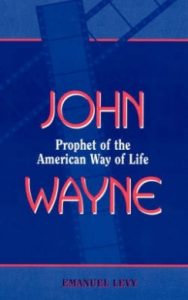John Wayne Chooses Favorite Movies:
1. Stagecoach (1939)
Directed by John Ford, Starring John Wayne
2. The Searchers (1956)
Directed by John Ford, Starring John Wayne
3. The Four Horsemen of the Apocalypse (1921)
Wayne’s selection of The Four Horsemen of the Apocalypse was not the 1962 version directed by Vincente Minnelli, which was a critical and commercial flop.
Wayne much preferred the 1921 silent version starring Rudolph Valentino, who plays a Frenchman who marries into a Spanish family torn apart by World War I.
The film was the biggest box office hit of the year, and made Valentino a superstar.
The film itself, while an interesting watch, hasn’t aged well over time. It’s heavy on the melodrama, but at two-and-a-half hours long, it wears out its welcome.
The film incorporates some interesting religious symbolism to sell the idea of World War I as a Biblically apocalyptic event, a bit novel for the time.
When Wayne was 13, he was so obsessed with the film, he saw it twice a day for an entire week at the movie theater in Glendale, California, where his family lived.
The film sparked a cultural sensation with Spanish culture and the tango, and it may have fostered young Wayne’s proclaimed fondness for Latin women. He would marry three times in his life, all to Latina women.
4. Gone with the Wind (1939)
Directed by Victor Fleming
Gone With the Wind isn’t the universally-praised epic it once was, as America comes to terms with the film’s problematic depiction of the Civil War and slavery. It’s impossible to defend the film’s romanticized view of slavery and the South, but it is possible to appreciate the film’s performances, technical achievements, and outstanding storytelling. To this day, it remains one of the best films Hollywood has ever produced, despite being a cultural product of the times.
Clark Gable and Vivien Leigh among the most iconic romantic couples ever put on film.
At the time of its making, filmmakers assured civil rights activists that the film would not engage in demeaning black stereotypes, but Butterfly McQueen’s character did just that. Hattie McDaniel’s Mammy, however, becomes the conscience of the viewers in her role; she says exactly what the audience is thinking.
Her Oscar win for Best Supporting Actress was important first step in Black actors gaining acceptance in Hollywood.
Wayne’s reputation has taken a hit over some controversial comments made during his lifetime, but his selection of Gone With The Wind as a favorite film should not cause anyone to make assumptions. Even today, critics recognize its greatness and importance in film history. Surprisingly, Wayne loved the film, even though he didn’t like Clark Gable at all. HBO Max offers Gone With The Wind to stream, but with disclaime videos that provide context and discussion about the film.
5. A Man for All Seasons (1966)
Directed by Fred Zinnemann
A Man for All Seasons is an unexpected one as Wayne’s top film.
Based on the play by Robert Bolt (the writer of Dr. Zhivago and Lawrence of Arabia), the film tells the story of an English nobleman Sir Thomas More (Paul Scofield) who refuses to bow to the King’s demand to accept his defiance of the Catholic Church, so he can divorce and remarry. Facing imprisonment and potential execution, More must decide whether his principles are worth losing everything.
The choice of the film as Wayne’s favorite offers a glimpse into the man himself. Wayne’s conservative values were often at odds with a more liberal Hollywood, especially when the 1960s shifted American culture. His embrace of a film in which a principled character who faced persecution likely resonated with him in the mid-1970s.
The film won 6 Oscars, including Best Picture, Best Actor (Scofield), Best Director, and Best Adapted Screenplay.
Robert Shaw (Jaws) was nominated for his striking role as King Henry VIII, but he was not rewarded.
The film’s main drawback is its deliberate pacing, which at times slows to the point of tedium. It’s an intriguing character study, however, and worth a watch if you have the time and attention.




